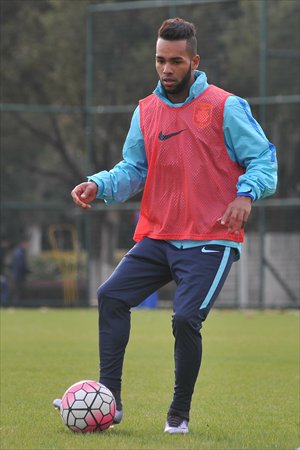New Year hopes for sports industry
Giant companies jump on bandwagon in hopes of cashing in

Alex Teixera of Jiangsu Suning takes part in a training session on February 14 in Nanjing, Jiangsu Province. Photo: IC
Just days before the lunar new year, Chinese sport enjoyed a huge boost highlighted by several major football transfer moves.
Reigning Chinese Super League (CSL) and Asian Champions League champions Guangzhou Evergrande signed Colombian striker Jackson Martinez from Atletico Madrid on a 42 million euro ($47 million) deal. A record transfer in China, this was later overshadowed by Jiangsu Suning's jaw-dropping purchase of Brazilian midfielder Alex Teixera, who joined from Shakhtar Donetsk, for 50 million euros.
Back in January, Jiangsu also made headlines when Ramires left Chelsea for the Nanjing-based club for 28 million euros, while AS Roma forward Gervinho singed for Hebei China Fortune for 18 million euros.
On top of all this, Brazilian Serie A MVP Renato Augusto will soon be playing under renowned Italian coach Alberto Zaccheroni at Beijing Guoan.
These shock moves made up four out of the five top transfers in the football world's winter transfer window. However, China's transfer window closes on February 26, which means it is entirely possible Chinese clubs will shock the world once again. So what are Chinese sports fans hoping for in 2016?
Future expectations
The record-breaking transfer fees are just the tip of the iceberg. The real hope for Chinese fans is for the country's sports industry to shake the world.
Chinese athletes are known for achieving the impossible. Sports fans are expecting to see breakthroughs, such as Chinese athletes breaking world records, as well as China surpassing world sports powerhouse the US in the medal table at the Rio Olympic Games.
After the State Council announced a guideline on how to accelerate the development of the sports industry and promote sports consumption in October last year, many experts believe that China has the potential to become the biggest sports market in the world within the next 20 years.
The guideline has set out some ambitious goals, which include increasing the number of people who regularly participate in sports activities to 500 million by 2025 and bringing the overall scale of the sports industry to 5 trillion yuan ($0.77 trillion) by the same year.
It's well known that major entrepreneurs from various industries have joined the rush into the sports world: Alibaba announced the establishment of the Ali Sports Group, Wanda Group acquired Infront Sports & Media and Word Triathlon Corporation, and Tencent became the exclusive official digital partner of NBA in China in a five-year deal valued at about $500 million.
What is not so widely known is that those big names in the sports industry made lucrative moves one by one into Chinese conglomerates, or even small and medium enterprises, in order to help them establish sports departments and seize opportunities in the sector.
This has led to a glut of fitness testing or counseling centers, stadium services, competitive sports shows and thousands of sports-related apps.
Furthermore, no successful Chinese business icon can now afford to not invest or at least have some potential plans for the sports industry.
Talent shortage
During the process of rapid development of China's sports industry, the most significant factor has been the lack of talented individuals rather than money. While the number of sports facilities reached the expected peak in just a few years, the quality of sports personnel has not.
One prime example is youth sports training, which plays an increasingly significant role in Chinese sports curricula.
However, according to a veteran primary school physical education teacher, many staff who had never played football or basketball are now teaching children how to play those sports.
The shortage of qualified professionals affects not only Chinese sports training, but also sports events organization.
In some cities' or districts' sports bureaus, only one or two officials are in charge of sports events, which often involves the participation of thousands of people.
Many of those staff have no holidays because there are different kinds of events almost every week waiting for their attention. When they find themselves too busy to complete their work, they have to ask local sports NGOs for help.
However, the smaller the city is, the fewer professionals the NGOs have. As a result, it is inevitable that the quality of the sports event is lower than expected.
At the same time, although there are numerous world champions in China, few of them are famous or receive adulation from the public.
By contrast, young actors and singers with little to their name have millions of followers.
This is not because world champions do not deserve any respect, but because China's entertainment industry is much more developed and advanced than sports.
This dearth of talents is a key issue for the development of China's sports industry, and there is no answer but bringing in more talents coupled with education, which costs money.
The good news is that Chinese companies, which can offer higher salaries, are now looking for talents from all over the world. Talent education needs time. Hopefully, this is just the beginning of the new era of China's sports industry.